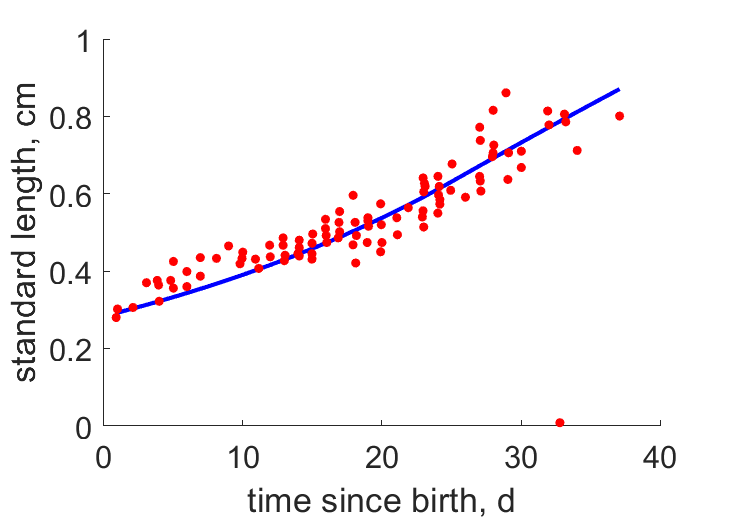Predictions & Data for this entry
| Model: abj | climate: MC | migrate: Mo | phylum: |
| COMPLETE = 2.3 | ecozone: MP, MI | food: biPz | class: |
| MRE = 0.140 | habitat: 0jMpe, jiMp | gender: D | order: |
| SMSE = 0.078 | embryo: Mpe | reprod: O | family: |
Zero-variate data
| Data | Observed | Predicted | (RE) | Unit | Description | Reference |
|---|---|---|---|---|---|---|
| am | 2190 | 2193 | (0.001467) | d | life span | guess |
| Lp | 2.25 | 2.25 | (6.926e-05) | cm | standard length at puberty | guess |
| Li | 4.5 | 4.583 | (0.01843) | cm | ultimate standard length | fishbase |
| Wwb | 0.00018 | 0.0001709 | (0.05071) | g | wet weight at birth | guess |
| Wwi | 0.71 | 0.7206 | (0.01487) | g | ultimate wet weight | guess |
| Ri | 2.74 | 2.882 | (0.05192) | #/d | max reprod rate | guess |
Uni- and bivariate data
| Data | Figure | Independent variable | Dependent variable | (RE) | Reference |
|---|---|---|---|---|---|
| tL |  | time since birth | standard length | (0.08739) | SassTaka2018 |
| tW |  | time since birth | dry weight | (0.3545) | SassTaka2018 |
Pseudo-data at Tref = 20°C
| Data | Generalised animal | Diaphus fulgens | Unit | Description |
|---|---|---|---|---|
| v | 0.02 | 0.02231 | cm/d | energy conductance |
| p_M | 18 | 310 | J/d.cm^3 | vol-spec som maint |
| k_J | 0.002 | 0.002 | 1/d | maturity maint rate coefficient |
| k | 0.3 | 0.03378 | - | maintenance ratio |
| kap | 0.8 | 0.95 | - | allocation fraction to soma |
| kap_G | 0.8 | 0.799 | - | growth efficiency |
| kap_R | 0.95 | 0.95 | - | reproduction efficiency |
Facts
- length-weight: Ww in g = 0.00759*(TL in cm)^3.02 (Ref: fishbase)
- Indian Ocean: 08N-10S and the Mozambique Channel southwards to 18S. Also the tropical Pacific including southeast Asian seas. South China Sea (Ref: fishbase)
- Species identification is unsure, but Diaphus fulgens is the most abundant Diaphus (Ref: SassTaka2018)
Bibliography